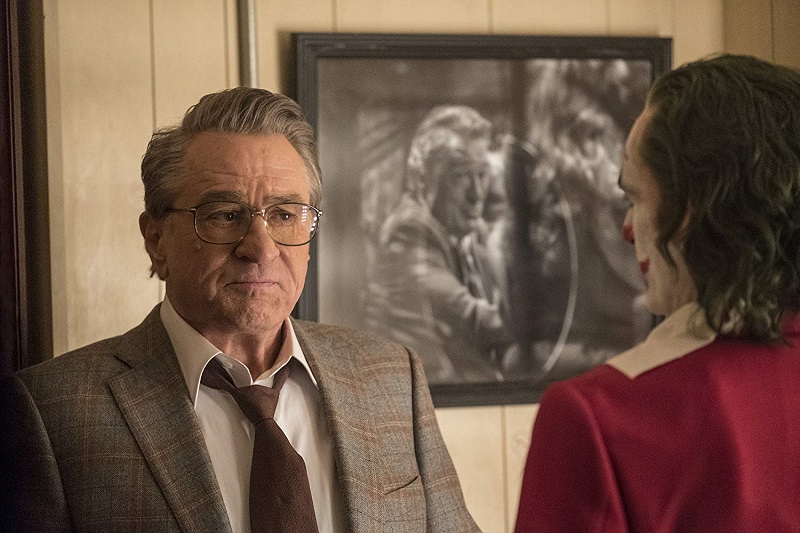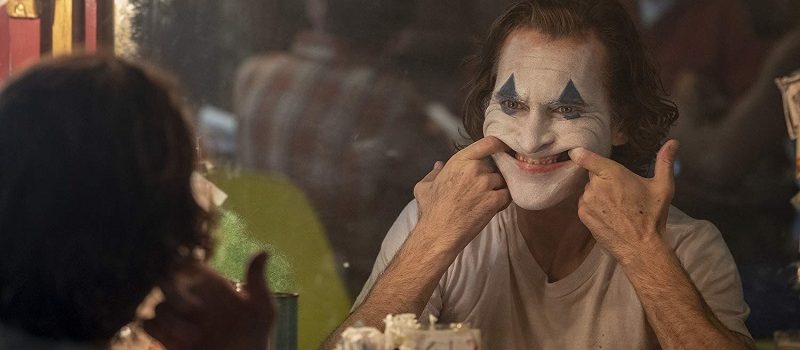Veteran comedy director Todd Phillips did something very few have done before: He tells a story about the making of an infamous villain. While his latest creation, Joker, is extremely entertaining, despite being wildly unapologetic like his past films, it’s also surprisingly innovative.

Joaquin Phoenix gives the performance of a lifetime. He completely submerses himself into the bleak, dark title character that is Arthur Fleck. We couldn’t imagine another actor achieving the performance level Phoenix did this awards season. From the iconic sinister laugh to the facial expressions, mannerisms, and weight loss, Phoenix truly pushes the envelope when it comes to portraying the genesis of the notorious Joker.
The audience is introduced to Arthur as he is preparing for his daily clown gig of spinning an advertisement sign on the streets of Gotham in the 70s. He clearly has some form of mental illness, which one isn’t exactly clear until later.
At first, Arthur just seems like a nice, somewhat troubled guy, who has been dealt some pretty bad cards in life that lacked the support system and guidance needed to truly succeed as a contributing member of society. This is mostly due to the fact that Fleck spends most of his time being the primary caregiver to his mentally unstable mother, Penny Fleck, played by the perfectly cast Frances Conroy.
Philips does a profound job of painting a character that we sympathize with initially, because the unjust way the world seems to bully him, but then realizes, as the film turns grim, “hey, we are society.” At which point, viewers get a feeling that resembles a punch in the stomach.
After years of constant physical abuse, and being treated poorly by society, Arthur finally snaps. The audience can actually feel this pressure mounting due to Phillips’s exquisite exposition of the complexity of the character. Even though the climax is almost predictable, that doesn’t negate from its shock value.
The cinematography is also noteworthy as the dark tones perfectly complement this gritty, violent tale. The shots are accompanied by a haunting score, composed by Emmy-nominated Icelandic musician Hildur Gudnadóttir, who also scored the Emmy-winning limited series for HBO, Chernobyl (one of The Movie Mensch’s favorite things we saw all year on any medium). These elements help, shape, and bring to life the complex evolution of Joker—a stand-up comedian turned supervillain.
Another stand-out performance in Joker comes from Robert De Niro. The legendary actor portrays an arrogant talk show host, Murray Franklin, who essentially invites Fleck on his show to ridicule him for his attempts at stand-up comedy. Franklin is a successful comedian who bullies another—obviously struggling—comedian just trying to make a living. He never had any intention of helping him. Like the Frank Sinatra song That’s Life, that runs throughout the film, says, “…Some people get their kicks stomping on a dream.” But as Joker points out “comedy is subjective” and “we (society) decides what’s funny.”

This is emblematic of what makes the film so hard to watch. It has such a strong, on-the-nose and in your face, blatant message.
Joker is perfectly reflective of a gruesome society that not only shuns mental illness but also sensationalizes and capitalizes on it. We live in a world where there is still such a stigma that surrounds the entity that is mental illness. It’s often considered weak or taboo to be vulnerable and express feelings of depression, anxiety and other disorders. Those who express those feelings are either exploited for capital gain for the sake of entertainment or, depending on their socioeconomic status, oftentimes eschewed. This often leads those who suffer from varied mental conditions, with no recourse for help, to act out in a cry for help—whether it be by imposing self-harm or harm to others. While Joker in no way excuses these folks’ often grotesque actions, it explains them in such a simple way that even a child could get it. Could some argue that Joker is pernicious? Perhaps. But art imitates life. As we see in the news every single day, life can be ugly. Phillips has just given us a raw, smack you in the face reminder that audiences won’t soon forget. Also, it arguably is an opportunity to become more aware and invoke large scale positive change. That might be just what a “woke” society needs to truly wake up.
Grade: A-

